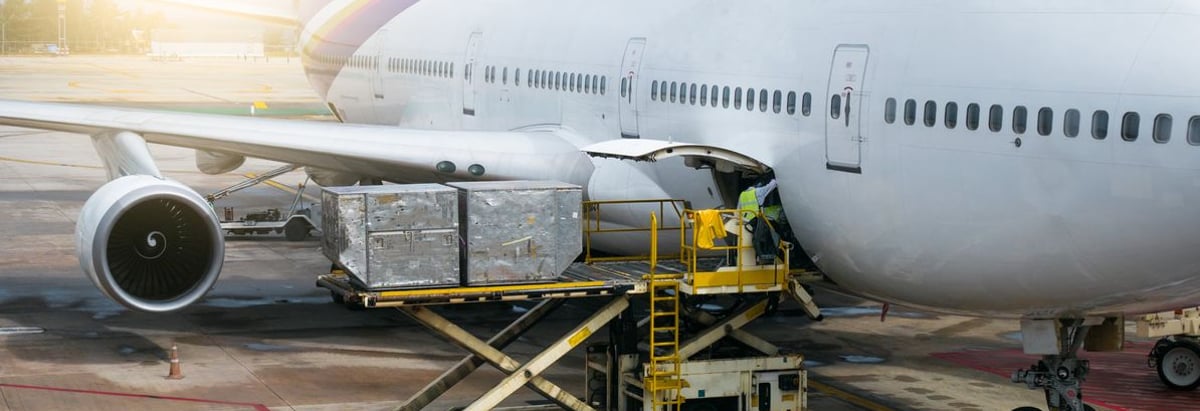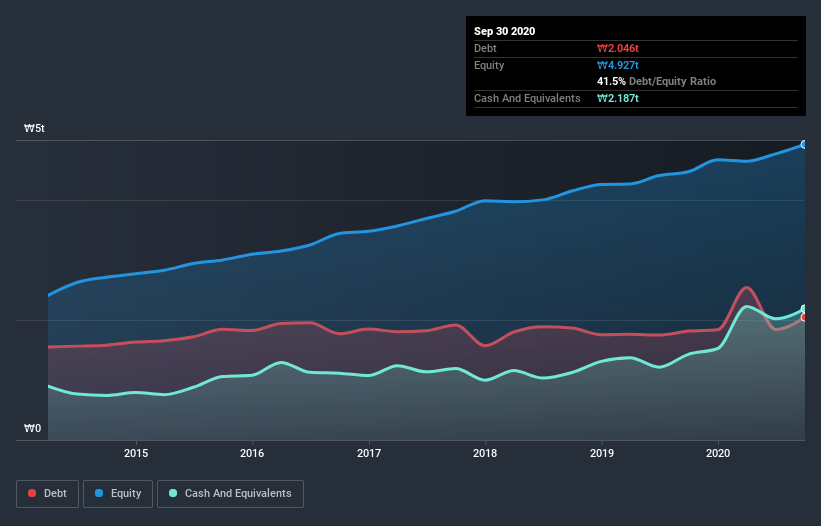
The external fund manager backed by Berkshire Hathaway's Charlie Munger, Li Lu, makes no bones about it when he says 'The biggest investment risk is not the volatility of prices, but whether you will suffer a permanent loss of capital.' When we think about how risky a company is, we always like to look at its use of debt, since debt overload can lead to ruin. We note that Hyundai Glovis Co., Ltd. (KRX:086280) does have debt on its balance sheet. But the real question is whether this debt is making the company risky.
What Risk Does Debt Bring?
Debt is a tool to help businesses grow, but if a business is incapable of paying off its lenders, then it exists at their mercy. Ultimately, if the company can't fulfill its legal obligations to repay debt, shareholders could walk away with nothing. However, a more frequent (but still costly) occurrence is where a company must issue shares at bargain-basement prices, permanently diluting shareholders, just to shore up its balance sheet. By replacing dilution, though, debt can be an extremely good tool for businesses that need capital to invest in growth at high rates of return. When we examine debt levels, we first consider both cash and debt levels, together.
See our latest analysis for Hyundai Glovis
What Is Hyundai Glovis's Debt?
The image below, which you can click on for greater detail, shows that Hyundai Glovis had debt of ₩1.26t at the end of September 2020, a reduction from ₩1.82t over a year. However, its balance sheet shows it holds ₩2.19t in cash, so it actually has ₩929.1b net cash.

A Look At Hyundai Glovis' Liabilities
We can see from the most recent balance sheet that Hyundai Glovis had liabilities of ₩3.08t falling due within a year, and liabilities of ₩2.41t due beyond that. On the other hand, it had cash of ₩2.19t and ₩2.14t worth of receivables due within a year. So its liabilities total ₩1.16t more than the combination of its cash and short-term receivables.
Of course, Hyundai Glovis has a market capitalization of ₩7.82t, so these liabilities are probably manageable. But there are sufficient liabilities that we would certainly recommend shareholders continue to monitor the balance sheet, going forward. While it does have liabilities worth noting, Hyundai Glovis also has more cash than debt, so we're pretty confident it can manage its debt safely.
But the bad news is that Hyundai Glovis has seen its EBIT plunge 16% in the last twelve months. If that rate of decline in earnings continues, the company could find itself in a tight spot. When analysing debt levels, the balance sheet is the obvious place to start. But it is future earnings, more than anything, that will determine Hyundai Glovis's ability to maintain a healthy balance sheet going forward. So if you want to see what the professionals think, you might find this free report on analyst profit forecasts to be interesting.
Finally, a business needs free cash flow to pay off debt; accounting profits just don't cut it. While Hyundai Glovis has net cash on its balance sheet, it's still worth taking a look at its ability to convert earnings before interest and tax (EBIT) to free cash flow, to help us understand how quickly it is building (or eroding) that cash balance. During the last three years, Hyundai Glovis generated free cash flow amounting to a very robust 83% of its EBIT, more than we'd expect. That positions it well to pay down debt if desirable to do so.
Summing up
While Hyundai Glovis does have more liabilities than liquid assets, it also has net cash of ₩929.1b. The cherry on top was that in converted 83% of that EBIT to free cash flow, bringing in ₩1.2t. So we don't have any problem with Hyundai Glovis's use of debt. Over time, share prices tend to follow earnings per share, so if you're interested in Hyundai Glovis, you may well want to click here to check an interactive graph of its earnings per share history.
Of course, if you're the type of investor who prefers buying stocks without the burden of debt, then don't hesitate to discover our exclusive list of net cash growth stocks, today.
When trading Hyundai Glovis or any other investment, use the platform considered by many to be the Professional's Gateway to the Worlds Market, Interactive Brokers. You get the lowest-cost* trading on stocks, options, futures, forex, bonds and funds worldwide from a single integrated account. Promoted
Valuation is complex, but we're here to simplify it.
Discover if Hyundai Glovis might be undervalued or overvalued with our detailed analysis, featuring fair value estimates, potential risks, dividends, insider trades, and its financial condition.
Access Free AnalysisThis article by Simply Wall St is general in nature. It does not constitute a recommendation to buy or sell any stock, and does not take account of your objectives, or your financial situation. We aim to bring you long-term focused analysis driven by fundamental data. Note that our analysis may not factor in the latest price-sensitive company announcements or qualitative material. Simply Wall St has no position in any stocks mentioned.
*Interactive Brokers Rated Lowest Cost Broker by StockBrokers.com Annual Online Review 2020
Have feedback on this article? Concerned about the content? Get in touch with us directly. Alternatively, email editorial-team (at) simplywallst.com.
About KOSE:A086280
Hyundai Glovis
Operates as logistics and distribution company in South Korea and internationally.
Flawless balance sheet and undervalued.


